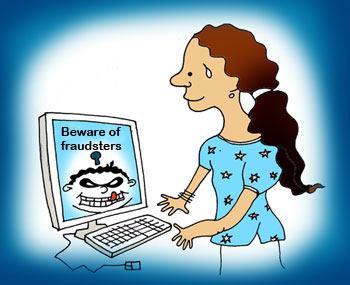Photographs: Uttam Ghosh/Rediff.com Lisa Chanamolu, Investmentyogi
Like most people I know, I am happy with online shopping and the convenience that it provides. I like the wide variety of choice that internet companies offer me, the cheaper prices and the ease of comparison shopping.
The fact that I can get all this shopping done in my most comfy pyjamas, while sitting on my couch, is not so bad either.
Some of my favourite purchases have been internet purchases using the 'couch potato' method.
Yet, as the old saying goes, 'all that glitters is not gold'.
While shopping online has many advantages, it can also come with some hazards that customers need to be aware of. Here are five categories for you to watch out for.
1. Item issues
Photographs: Uttam Ghosh/Rediff.com
One of the biggest item issues you may face while online shopping is inaccurate sizes. Keep in mind that different countries have different ideas of the perfect fit. Before you order that amazing New Year's dress, check to see the comments of what other customers have said about their experiences regarding sizing.
Other issues you may face while shopping online is receiving items that have been used, are in poor condition, or the item has been damaged in shipping. To make the most of your shopping experience and avoid these problems, research the return policy.
Are returns free or is there a cost? If you need to, can you return the item to a brick and mortar location?
2. Hidden cost
Photographs: Dominic xavier/Rediff.com
Occasionally, while shopping online you get hit with unexpected delivery charges for shipping and handling. Make sure you understand the shipping cost. Is each item shipped separately, therefore, increasing your overall expenditure?
If that is the case, you may want to reconsider your small purchase items.
Watch out for discounts and coupons.
Some sites make it look like you will get big savings for buying more. Make sure you read the 'terms and conditions (T&C)' of the offer.
Most items are very specific and you may find it hard to match your needs with the coupon/discounts requirements.
Know the return policy, once you hit the order button, you may not be able to exchange, return or cancel your order. If you are too quick on the order button, it may take a while for the site to process your purchases.
By hitting the order button again, you may be billed twice. Patience is a key factor in online shopping.
Note: You can usually find all site and return policies, postage and shipping cost, etc., on the web site you are ordering from.
3. Payment/Currency issues
Photographs: Dominc Xavier/Rediff.com
Before you give your payment information, make sure you understand how the payment page works.
Most sites will usually allow a final review of your payment page before you buy. Take the time to review this page before you hit submit. If the site does not allow you this option, consider using a different site for your purchases.
Be clear on the type of currency/rate of exchange that is being charged. The Internet is far-reaching and prices appear in all kinds of currencies. You can find currency convertors on the internet that are updated regularly.
While exchanging currencies find out if there are any charges made for the conversion.
Note: Most companies will use a higher conversion rate.
4. Timely delivery
Photographs: Dominc Xavier/Rediff.com
Given the vastness of the Internet, you can order from around the world. Find out if the site you are using has a guarantee on their delivery time.
If you need the item in a specific time frame, give yourself plenty of time in advance for unexpected surprises (that is, delayed or lost packages, damaged/return times, etc.).
If you do have any questions regarding the items, is there a link for a contact person/department? If you are making a large purchase, try sending an e-mail before your purchase.
If you don't get a response, try another site.
5. Frauds
Photographs: Dominc Xavier/Rediff.com
Unfortunately, the most common type of fraud in online shopping is credit card fraud. Use only secured sites to avoid this happening to you. Look for the following to make sure the site you are using is secure.
1) A small lock icon in the lower left hand side of the page.
2) URLs starting with https (the s at the end guarantees the payment agteway is secured using solid data encrytion while being sent to the gateway) instead of http.
Every time you use your credit card online, you run the risk of credit card theft.
A few tips are to NEVER give your credit card information in an e-mail or any other personal information for that matter. There are a lot of scamsters who will ask you to update an account such as PayPal; this is a way to find out if your account is active. These e-mails are fraudulent.
The second kind of fraud you may run into is vendor fraud. The product being displayed could be completely false or defective. The vendor may take your payment and not send the product.
The best idea is to use only trusted sites. Look at the vendor rating and consumer reviews to discover the reputation of the vendor.
In conclusion
Using the Internet for shopping can be a fun and rewarding experience. Be smart and protect yourself by using only trusted sites, know the site policies and review payment forms before submitting.








Comment
article